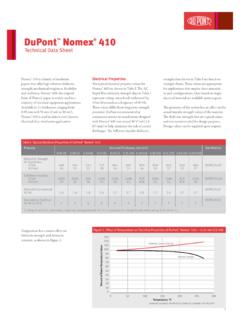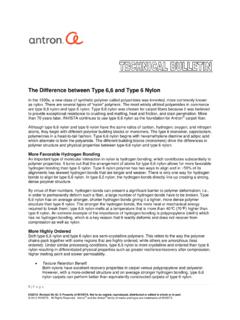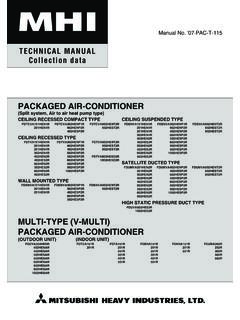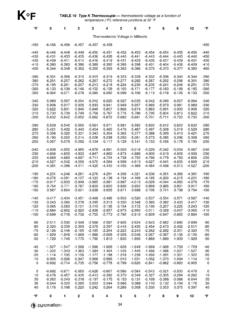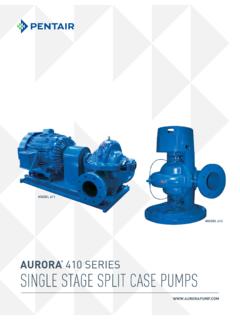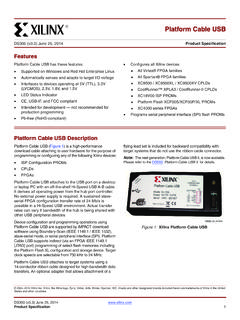Transcription of dupont nomex paper type 410
1 dupont nomex paper type 410. dupont nomex paper Type 410 is an insulation paper which values differ from long-term strength potential. dupont offers high inherent dielectric strength, mechanical toughness, recommends that continuous stresses in transformers not flexibility and resilience. nomex paper Type 410 is the original exceed kV/mm (40 V/mil) to help minimize the risk of partial form of nomex paper , and is widely used in a majority of discharges (corona). The full wave impulse dielectric strength electrical equipment applications. Available in 11 thicknesses data shown in Table 1 are based on multiple sheets. These ( to mm) (2 to 30 mil), nomex paper Type 410 is used values are appropriate for the applications which employ these in almost every known electrical sheet insulation application. materials in such configurations. Data based on single sheets of material are available upon request.
2 Electrical Properties The geometry of the system has an effect on the actual impulse The typical electrical property values for nomex paper strength values of the material. The dielectric strength data Type 410 are shown in Table 1. The AC Rapid Rise dielectric are typical values and not recommended for design purposes. strength data of Table 1, representing voltage stress levels, Design values can be supplied upon request. withstood 10 to 20 seconds at a frequency of 60 Hz. These Table 1 Typical Electrical Properties Nominal Thickness (mil) 2 3 4 5 7 10 12 15 20 24 29 30. (mm) Dielectric strength AC rapid rise1. (V/mil) 460 565 527 715 865 845 870 850 810 810 760 680. (kV/mm) 18 22 21 28 34 33 34 33 32 32 30 27. Full wave impulse2. (V/mil) 1000 1000 864 1400 1400 1600 N/A 1400 1400 N/A N/A 1250. (kV/mm) 39 39 34 55 55 63 N/A 55 55 N/A N/A 49. Dielectric Constant3.
3 At 60 Hz Dissipation Factor 3. at 60 Hz (x 10 3) 4 5 6 6 6 6 7 7 7 7 7 7. 1. ASTM D-149 using 50 mm (2 inches) electrodes, rapid rise; corresponds with IEC 60243-1 subclause except for electrode set-up of 50 mm (2 inches). 2. ASTM D-3426. 3. ASTM D-150. Please note: The properties in this data sheet are typical or average values and should not be used as specification limits. Unless otherwise noted, all properties were measured in air under standard conditions (in equilibrium at 23 C, 50%. relative humidity). Note that, like other products of papermaking technology, nomex papers have somewhat different properties in the papermaking machine direction (MD) compared to the cross direction (XD). In some applications it may be necessary to orient the paper in the optimum direction to obtain its maximum potential performance. Temperature has a minor effect on dielectric strength and The relatively minor effects of moisture (humidity) on the dielectric constant, as shown in Figure 1.
4 Electrical properties of nomex paper Type 410 mm (10 mil) are shown in Table 2. Variations in frequency up to 104 Hz have essentially no effect on the dielectric constant of dupont nomex paper Like other organic insulating materials, nomex paper is Type 410. The effects of temperature and frequency on gradually eroded under attack by corona discharges. Corona dissipation factor of dry nomex paper Type 410 mm intensity is a function of voltage stress, which, in turn, depends (10 mil) paper are shown in Figure 2. The 60 Hz dissipation almost entirely on design parameters such as spacing between factors of thinner papers are essentially the same as those circuit elements, smooth vs. sharp contours, etc. Although for mm (10 mil) at temperatures up to 200 C. At higher corona does not occur during normal operation of properly temperatures and frequencies, the thicker papers have designed electrical equipment, any device may be subject to somewhat higher dissipation factors than those shown for occasional overvoltages which produce brief corona discharges.
5 The mm (10 mil). and it is important that the insulation not fail prematurely under these conditions. The voltage endurance (time to failure Surface and Volume Resistivities of dry nomex paper Type 410 under corona attack) of nomex paper Type 410 is superior to mm (10 mil) paper are shown in Figure 3 as functions of other commonly used organic insulations and even compares temperature. The corresponding values for other thicknesses of favorably with some inorganic compositions, as shown in nomex paper Type 410 are very similar. Figure 4. These data were obtained in all cases on single layers of mm (10 mil) materials at room temperature, 50% relative humidity, and 360 Hz frequency. Times to failure at 50 60 Hz are Figure 1. Effect of Temperature on Electrical Properties approximately 6 7 times as long as indicated. nomex paper Type 410 mm (10 mil).
6 130. Figure 3. Resistivity versus Temperature . 120. Dielectric constant (60 Hz) nomex paper Type 410 mm (10 mil). 110. Percent of Room Temperature Value 100 19. 10. 90. Dielectric strength 18. 10. 80. 70 17. 10. 60. Volume Resistivity, or 16. 10. Surface resistivity, ohm2. 50. 40 15. 10. 30 Surface resistivity 14. 20 10. 10 13. 10. 0 Volume resistivity 12. 0 50 100 150 200 250 300 10. Temperature, C 11. 10. Dielectric constant ASTM D-150; Dielectric strength ASTM D-149. 10. 10. 0 50 100 150 200 250 300. Temperature, C ASTM D-257. Figure 2. Dissipation Factor versus Temperature and Frequency . nomex paper Type 410 mm (10 mil). Table 2 Humidity Effects on Electrical Properties . 60 Hz nomex paper Type 410 mm (10 mil). Relative Humidity, % Oven Dry 50 96. 2. 10 Hz Dielectric Strength1. Dissipation Factor (V/mil) 850 815 780. (kV/mm) Dielectric Constant2.
7 3. 10 Hz at 60 Hz at 1 kHz 4. 10 Hz Dissipation Factor3. at 60 Hz (x 10 3) 6 6 11. at 1 Hz (x 10 3) 13 14 25. Volume Resistivity, 6 x 1016 2 x 1016 2 x 1014. 0 50 100 150 200 250 300. ( ). Temperature, C ASTM D-150 1. ASTM D-149 using 50 mm (2 inches) electrodes, rapid rise; corresponds with IEC 60243-1. subclause except for electrode set-up of 50 mm (2 inches). 2. ASTM D-3426. 3. ASTM D-150. Mechanical Properties Figure 4. Voltage Endurance of Various Insulating Materials Single Layer nomex paper Type 410 mm (10 mil). The typical mechanical property values for dupont nomex . 24. paper Type 410 are shown in Table 3. The effects of high Glass/mica splittings/glass temperatures on tensile strength and elongation are illustrated in (with silicone). 20. Figure 5. nomex sheet structures also retain good mechanical Polyester (mat/film/mat) Polyester film properties at very low temperatures.
8 At the boiling point of liquid 16 100% epoxy impregnation nitrogen (minus 196 C or 77 K) the tensile strength of nomex . Stress in kV/mm Rag paper 12. paper Type 410 mm (10 mil) paper exceeds its room nomex paper Type 410. temperature value by 30 to 60% (depending on direction), while 8. elongation to break is still greater than 3% (better than most Asbestos paper inorganic materials at room temperature). This allows nomex 4. paper Type 410 to work well in cryogenic applications. 0..01 .1 1 10 100 1000 10000. The effects of moisture (humidity) on tensile strength and Time, hr, for 5th of 10 Failures ASTM D-2275 360 Hz elongation are shown in Figure 6. Like elongation, the tear strength and toughness of nomex paper Type 410 are also Figure 5. Effect of Temperature on Mechanical Properties . nomex paper Type 410 mm (10 mil). improved at higher moisture contents.
9 140. The dimensions of bone-dry dupont nomex paper Type 410 130 Tensile elongation (MD). 120. exposed to 95% relative humidity conditions will increase at 110. Percent of Room Temperature Value most 1% in the machine direction and 2% in the cross direction 100. (due to moisture absorption). This swelling is largely reversible 90. 80. when the paper is redried. The rate of change in dimensions will 70. depend, of course, on paper thickness and configuration (for 60. Tensile strength (MD). example, individual sheets versus tightly wound rolls). Variations 50. 40. in environmental humidity will usually produce dimensional 30. changes which will be less than 1%. 20. 10. 0. 0 50 100 150 200 250 300. Temperature, C ASTM D-828. Table 3 Typical Mechanical Properties Nominal Thickness (mil) 2 3 4 5 7 10 12 15 20 24 29 30. (mm) Test Method Typical Thickness (mil) 1.
10 (mm) ASTM D374. Basis Weight, g/m 2. 41 64 88 115 174 249 310 395 549 692 846 839 ASTM D646. Density, g/cc Tensile Strength, N/cm MD 43 68 93 141 227 296 380 462 610 728 832 816. ASTM D828. XD 19 34 49 71 116 161 208 252 374 500 623 592. Elongation, %. MD 9 12 12 16 20 22 23 20 21 18 16 18. ASTM D828. XD 7 9 9 13 15 18 18 16 17 14 13 14. Elmendorf Tear, N. MD N/A N/A N/A. TAPPI414. XD N/A N/A N/A. Initial Tear Strength2, N. MD 11 16 24 31 48 69 88 110 158 191 233 233. ASTM D1004. XD 6 9 14 17 27 42 55 71 114 153 193 193. Shrinkage at 300 C, %. MD XD 1. Method D; 17 N/cm2. 2. Data presented for Initial Tear Strength is listed in the direction of the sample per ASTM D-1004. The tear is 90 degrees to sample direction hence for papers with a higher reported MD ITR, the paper will be tougher to tear in the cross direction. MD = machine direction of paper XD = cross direction of paper Figure 6.
